From Oxford and Cambridge to 17 years in missions
by Tan Huey Ying // October 28, 2018, 8:26 pm
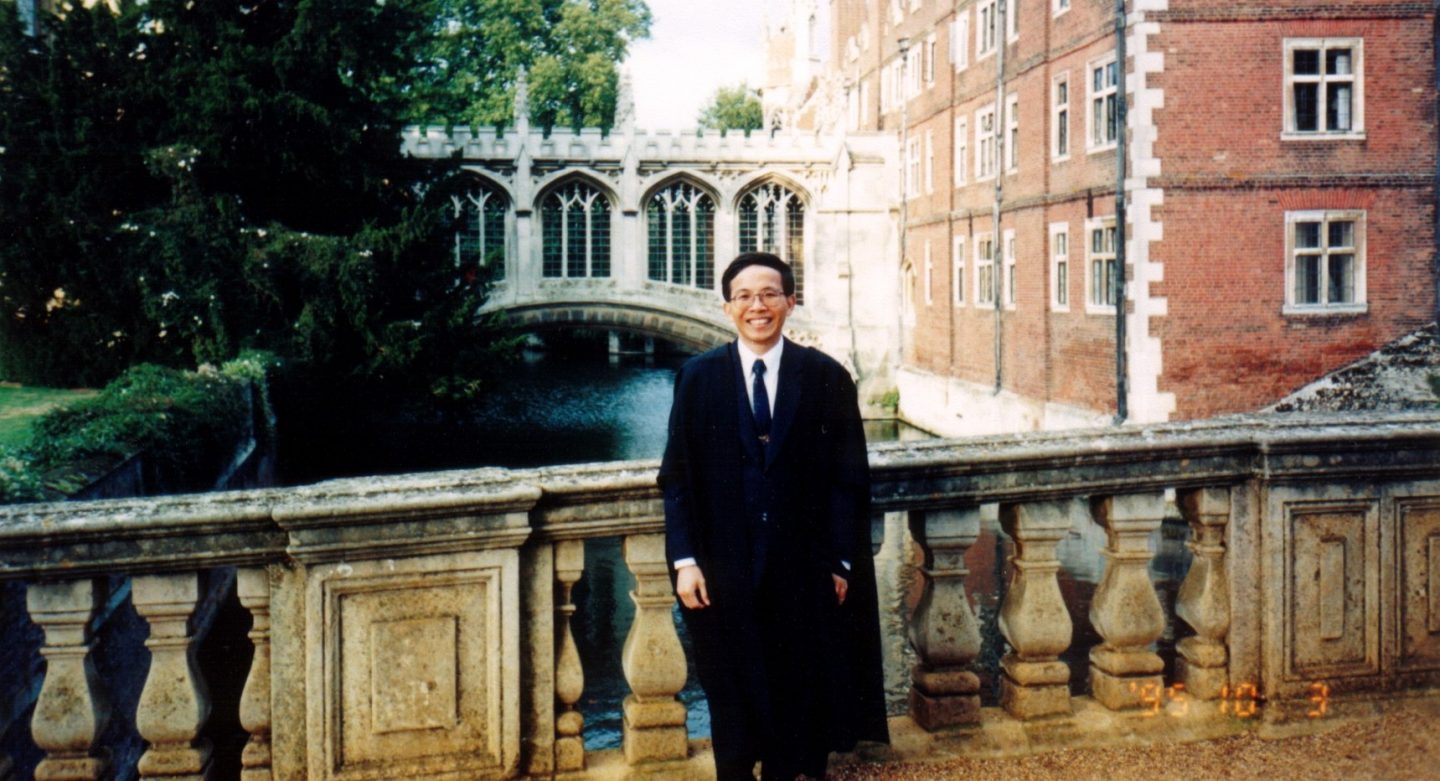
Matriculation photo of Dr David Tan at the Bridge of Sighs, St John's College, Cambridge. All photos courtesy of David and Sharon Tan.
He has a degree in Physics from Oxford and a PhD in Applied Mathematics from Cambridge.
She read law at Oxford and has a Masters in Library Science.
According to the typical Singapore story, Dr David Tan and his wife Sharon were destined to be high flyers in the civil service or the glamorous corporate stratosphere.
That did not happen.
Instead the couple chose to serve for 17 years at Wycliffe Bible Translators Singapore.
For 10 of those years, they were missionaries doing painstaking Bible translation work for a minority group in a nation where open evangelism was not permitted.
Turns out the educational qualifications of Dr David Tan and his wife Sharon had little bearing on where God would take them.
When David met Sharon
Dr David Tan, now 54, grew up in a poor family as the youngest of seven siblings.
As a result, he had ruled out dating girls from higher social backgrounds because he presumed they would have different values.
But when he met Sharon at Christian fellowship in Oxford University, he realised that she shared similar views on stewardship and simple living.
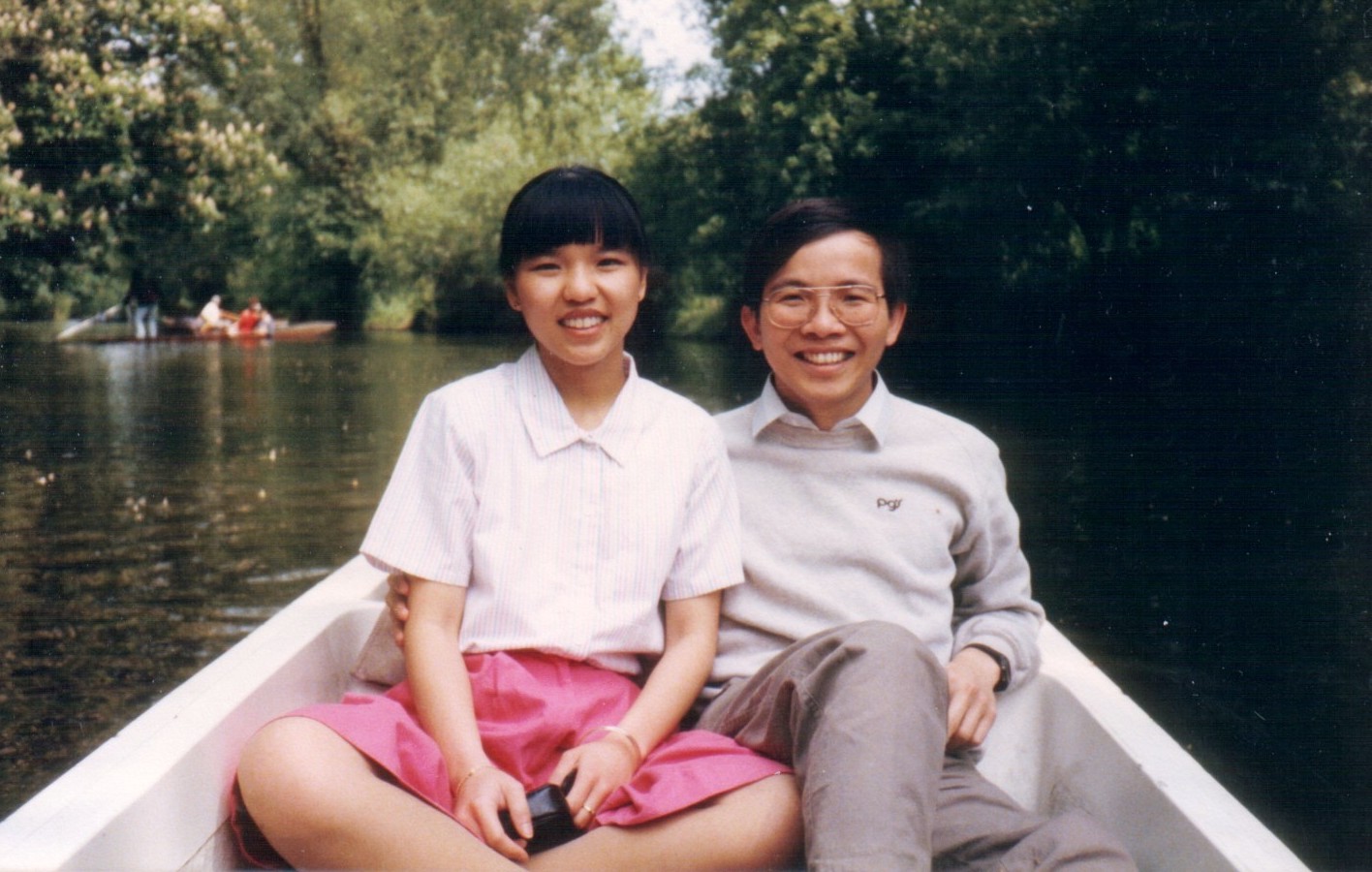
Punting in Oxford, 1986. David and Sharon grew up differently, but they share similar value systems, particularly with regard to stewardship.
“She’s from the upper middle class. Her father was a professor and her mother, a principal,” said David.
Unlike David, who was on an Air Force scholarship, Sharon’s parents could well afford to send her to Oxford sans scholarship.
“I know a lot of girls can be quite high maintenance. But I must say, I’m fairly low maintenance … certainly in terms of monetary expenditure,” quipped Sharon over David’s burst of laughter.
The strength of their shared perspective on life and stewardship fortified their relationship as they served actively together in Christian fellowship.
Shortly after their graduation in 1986, the couple got married in Singapore at the tender age of 23.
Coming home
Back in Singapore, life was good. David was serving out his bond with the Singapore Air Force while Sharon worked at the Monetary Authority of Singapore (MAS).
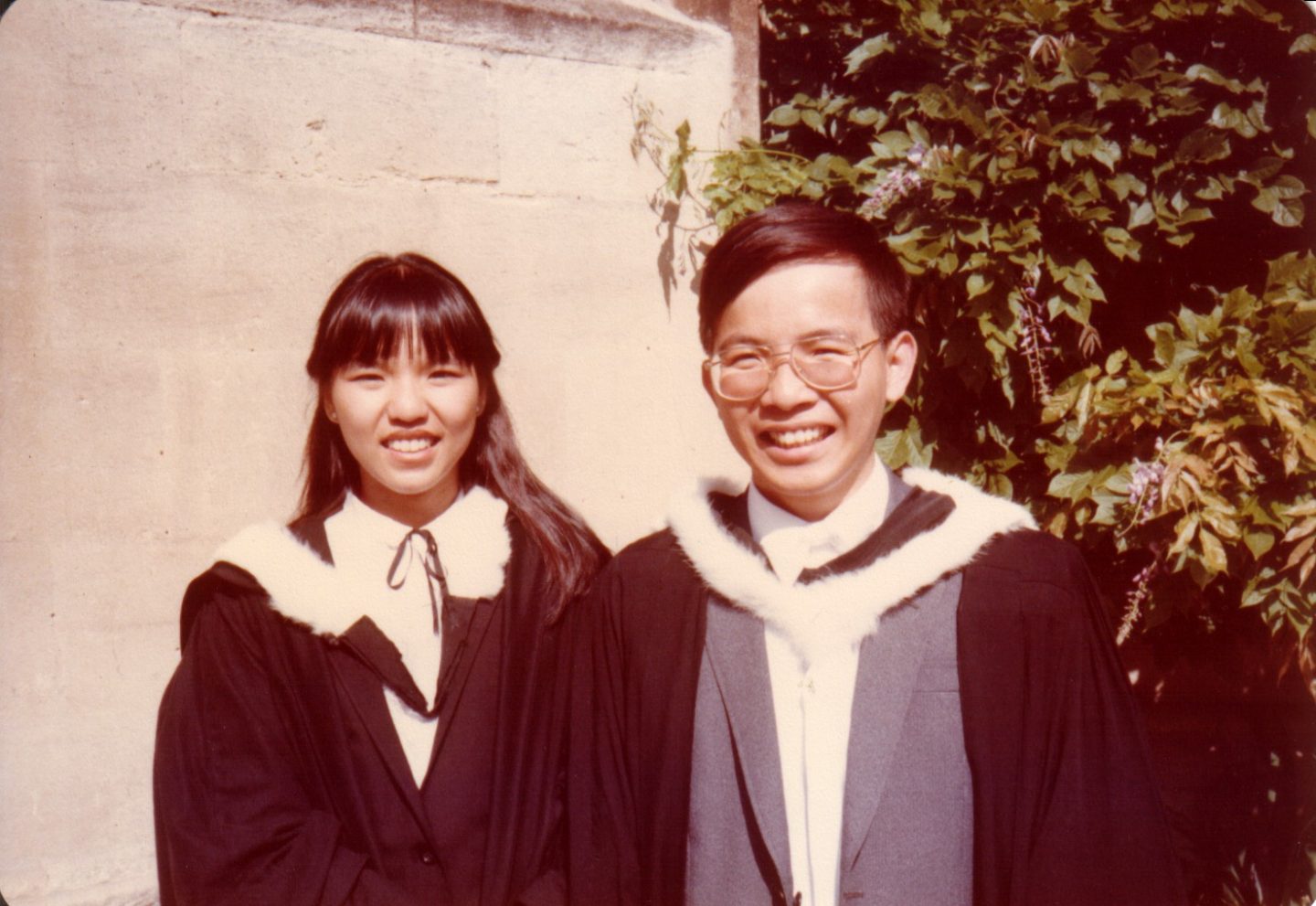
David and Sharon at their Oxford graduation in 1986.
Despite their stable jobs and comfortable incomes, the couple lived simply in an HDB flat with one second-hand car.
“In those days, the 80s, cars were cheap what!” David exclaimed, “So it’s like, ‘Hey! We can own two cars!’”
But they stuck to one.
Sharon added: “We didn’t need another car. I took the bus to work every day.”
Their values on stewardship were clear. “It’s not your right to spend the money that you earn, just because you have it.”
“Think about it,” said David. “It is God who gave us the ability to work.”
Missions calling
Living simply in Singapore was not an issue for Sharon.
But missions was a different story altogether. “It wasn’t something on my horizon,” she said.
“I’ve always thought that missions was not for me, it’s for other people who are very gung-ho. I will just be a good Christian here in Singapore!”
“Missions is for other people who are very gung-ho. I will just be a good Christian here in Singapore!”
David, on the other hand, felt drawn towards missions ever since he attended his first Missions Sunday in his church.
“It seemed like something God had put on my heart.”
But he had a bond to complete and Sharon was reluctant.
David was “okay” with his job in the Air Force, but he could not see himself doing this in the long-term; he preferred “something more meaningful”.
He had encountered operations research which involved the utilisation of math algorithms to determine the optimal use of resources, and was interested in studying that subject.
Sharon’s personal reservations did not stop her from supporting David in exploring mission work. With her encouragement, he joined his church’s missions committee and went on short-term trips.
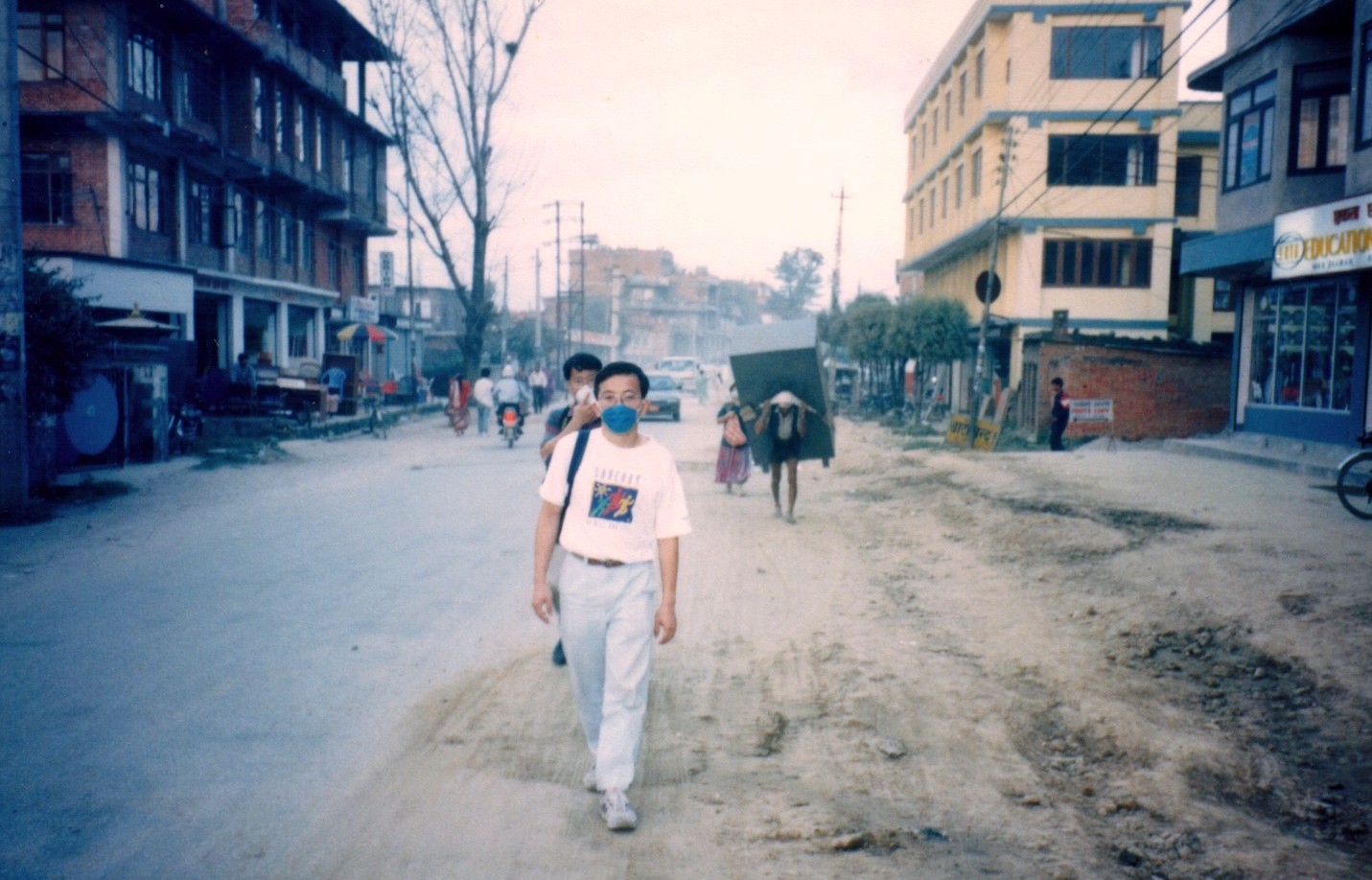
David on his first mission trip to Nepal in 1994. Sharon had told him, “You go explore first.”
As he neared the end of his bond in 1995, David started planning the next step.
Through his exposure to Applied Mathematics at work, David had developed a strong interest in it and wanted to pursue further studies.
“The Lord blessed me with a good mind … I always had this dream of becoming a math professor or researcher, working on famous unsolved theorems,” he said.
“The Lord blessed me with a good mind … But how did a PhD in Applied Mathematics fit with cross-cultural missions?”
But there was a nagging concern: How did a PhD in Applied Mathematics fit with cross-cultural missions? Were they even compatible?
Hoping for a clear sign from the Lord, David applied for several PhD programmes.
He struggled to reconcile his love for math with his call to missions.
But God’s answer came in the form of wise advice from an Anglican priest, an old friend of David’s.
“Essentially his point was: If you are walking with the Lord, you don’t need to be so afraid that you are straying from His will. The main thing is, often when you want to please the Lord …” David paused. “Doing what’s on your heart? It’s okay.”
A PhD would be especially useful if they were to go to a “creative access” nation, where the Gospel cannot be preached openly, he reasoned.
“In my simplistic thinking, I wanted to do missions using an academic platform.”
Despite the multiple offers he received, taking up a scholarship was out of the question.
Sharon added: “Do the math: He was 31. Four years of study, eight years of bond. By the time you get to the field …”
“… We felt that it was not wise to tie up those years of my life,” David finished her sentence.
Eventually, David and Sharon settled on Cambridge University’s PhD in Applied Mathematics programme.
In 1995, David completed his bond and Sharon quit her job at MAS and moved to Cambridge, with the assurance that “it was okay”.
Two miracles
The couple was still childless when they made the decision to move to Cambridge together for David’s PhD.
The last four years had been a difficult and stressful time as they went through several rounds of fertility treatments and even a miscarriage.
Being unable to conceive was particularly painful for Sharon who, until then, had not encountered major challenges to her faith.
“My life had always been very smooth,” she said frankly. “You know, do well at school, get the courses you want. But I basically reached a point where I told God, ‘If it’s Your will, You can make it happen.’ And we left it at that.”
For this pair of self-confessed “planners”, God had a greater plan.
They did not expect just how “okay” things would turn out, nor could they foresee what God had prepared for them.
For this pair of self-confessed “planners”, God had a greater plan – one that involved blessing them with the desires of their hearts (Psalm 37:4) as they walked with Him.
In Cambridge, David and Sharon planned their first mission trip together.
When the couple went to get their vaccinations for the mission trip to Central Asia, Sharon had a nagging suspicion she was pregnant.
The clinic nurse did the tests and it was confirmed: They were having a baby!
This was God’s gracious answer to a desire that they had long set aside. … But what timing, just as they were leaving for a mission trip!
David and Sharon believed it was no coincidence. If God saw fit to finally give them the child they had desired for so long, then, as Sharon put it: “How can you turn your back on God and say, ‘Because of Your gift, I’m not going to do what You asked me to do’? Frankly, that’s ingratitude, right?”
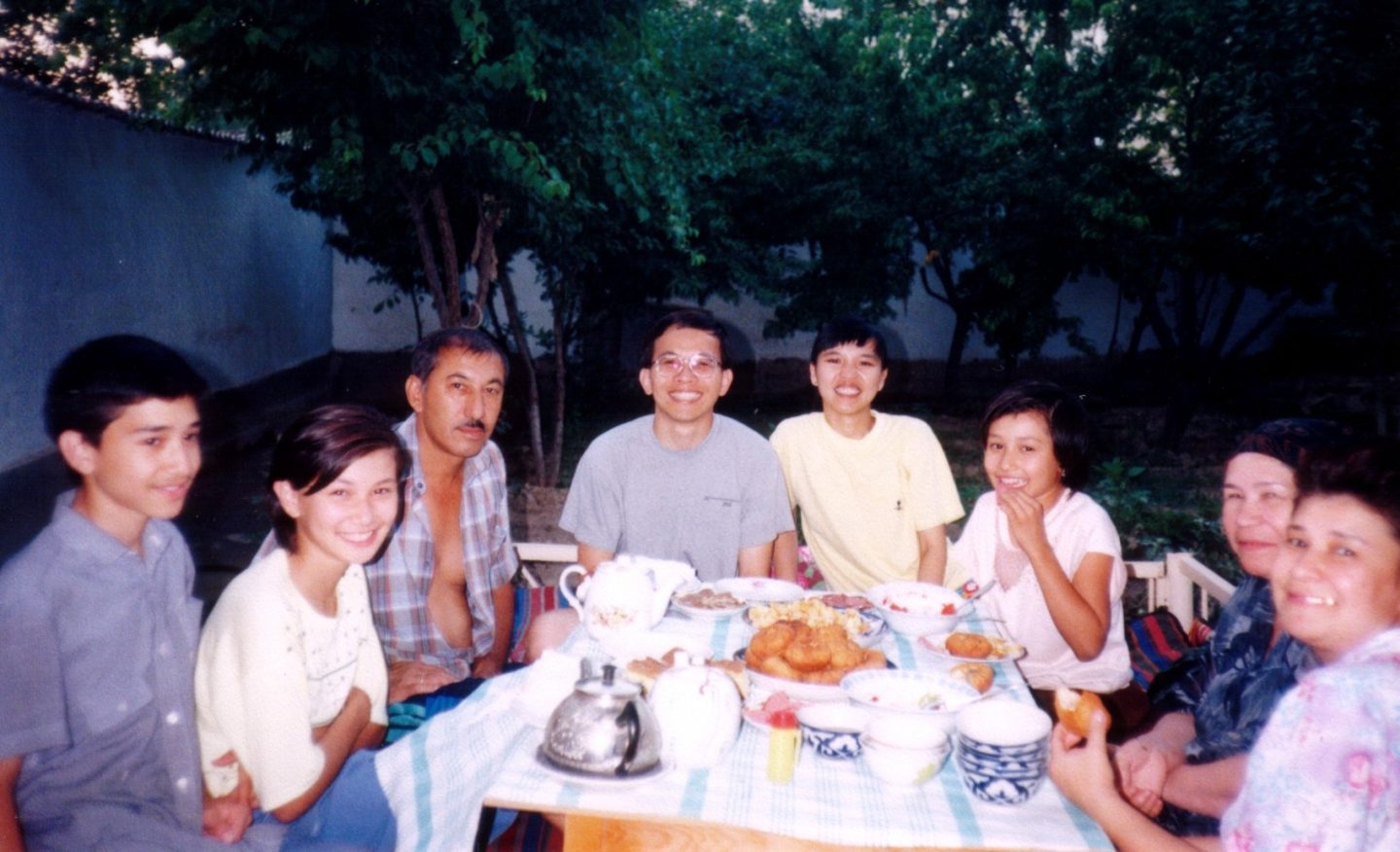
David and Sharon (in the middle) on Sharon’s first mission trip in 1996. They stayed with a local family to experience their culture.
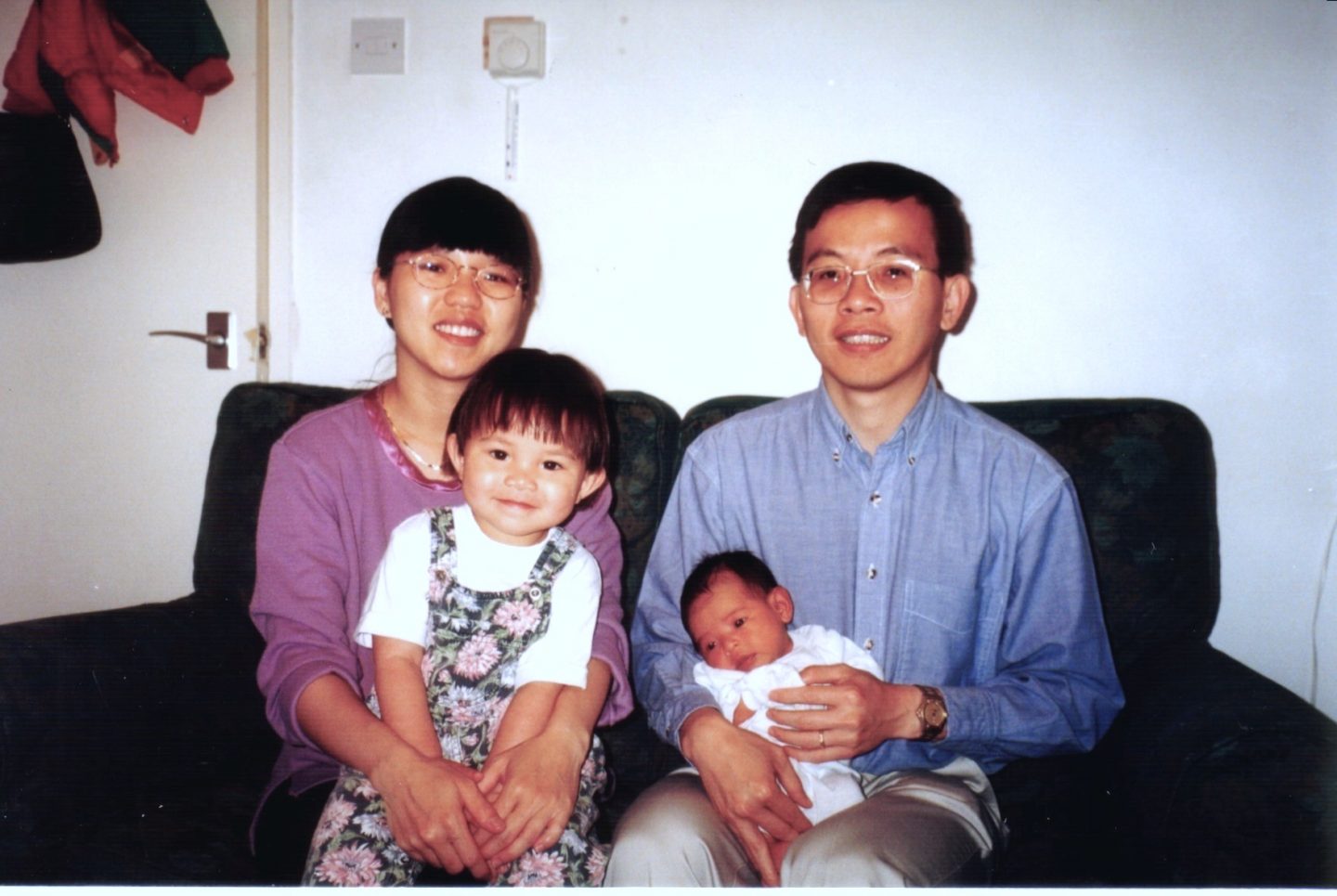
The Tan family, taken in Cambridge shortly after Carrie was born in 1999.
So, instead of postponing the trip, the couple put an embargo on the news – knowing their families would object to their leaving – and went for the mission trip anyway.
Having seen up-close how a long-term missionary family lived, Sharon’s main takeaway was: “Maybe I can handle it after all.”
Four years later, in the summer of 1999, David graduated with a PhD in Applied Mathematics. The couple returned to Singapore with, not one, but two children!
Heart language
As David spent the next year in research, he soon realised that, as much as he loved math, he wasn’t “particularly keen” about a career in it as it would be “basically, a paper, pencil, yourself and four walls”!
Not ideal for an extroverted individual like David.
“On hindsight, there are certain things in life that sometimes you need to do, in order to put it behind you.”
David felt ready to move on with no regrets.
“I’m a science guy! I’ve never been very strong in languages. It was a gamble, but also a step of faith.”
Ever the strategist, David had been on the lookout for a mission organisation whose work would fit both Sharon’s and his personalities.
He knew Sharon’s heart for God, the strength of her devotion and the values she held.
“But Sharon’s not the touchy-feely type,” David said with a laugh.
Eventually, they settled on Wycliffe.
“We were totally sold,” Sharon said. “Both of us grew up in church. We thought about what we would have become if we didn’t have Scripture that we could read and understand.
“We applied to Wycliffe because we believe in the ministry.”
David admitted: “I wasn’t sure I would cut it as a linguist. I’m a science guy! I’ve never been very strong in the humanities or at languages. It was kind of a gamble, but also a step of faith.”
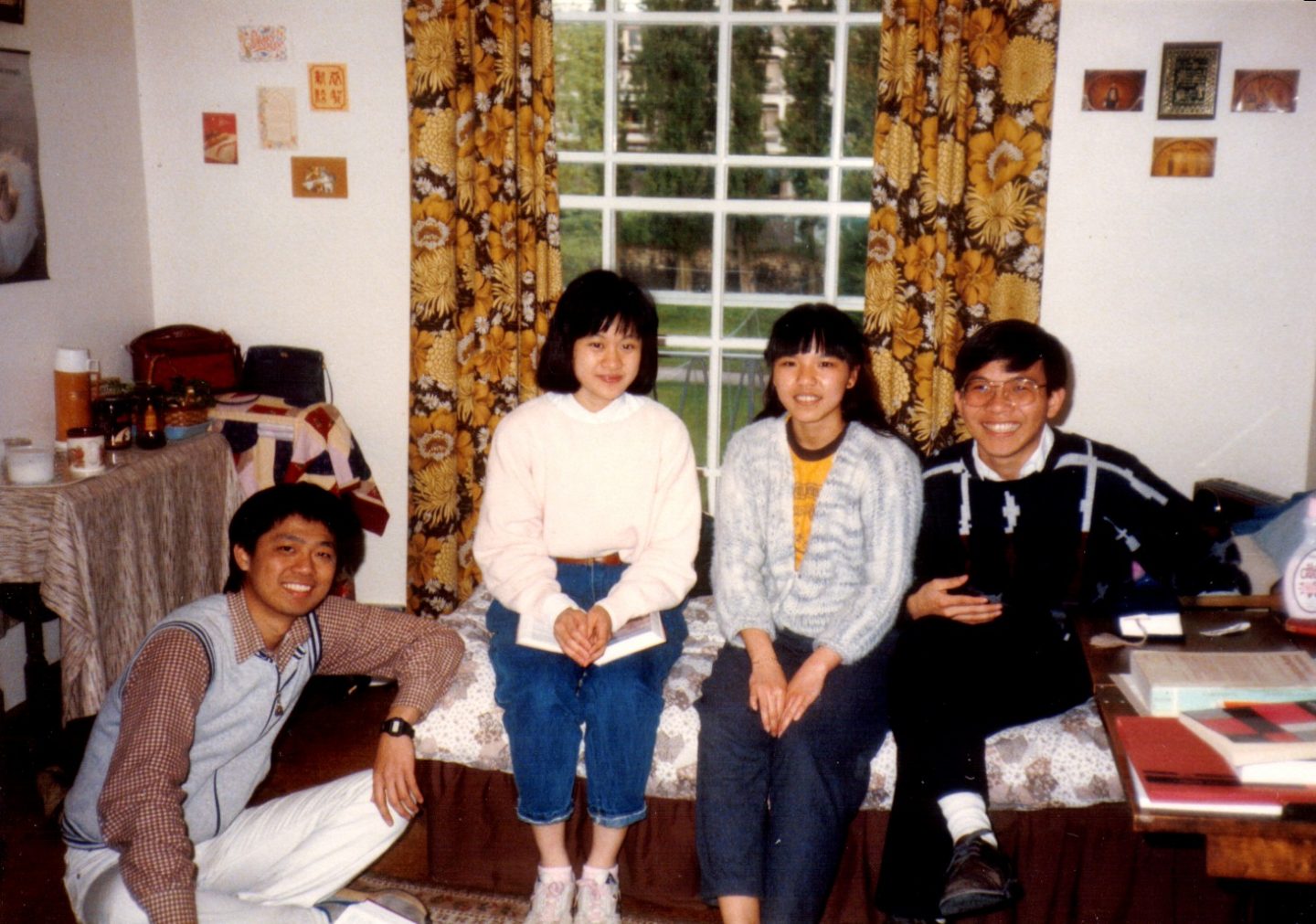
The Bible study group at Oxford university, where David and Sharon met as first-year undergrads.
But after linguistics training, David discovered he was “actually a good language learner”.
The “good mind” that David was blessed with had come with an affinity for language awareness and sensitivities – a valuable skill for a Bible translator pioneering work amongst an unreached people group (UPG).
God had yet another surprise in store – one which transformed David’s cerebral belief in Wycliffe’s goals into a personal resonance.
On a personal retreat several years ago, David had broken down when he listened to a Hokkien worship song, Khan Goa Eh Chiu (Hold my hand).
Explaining the idea of a “heart language”, David said that it is usually the language that someone acquires from birth and resonates with his heart.
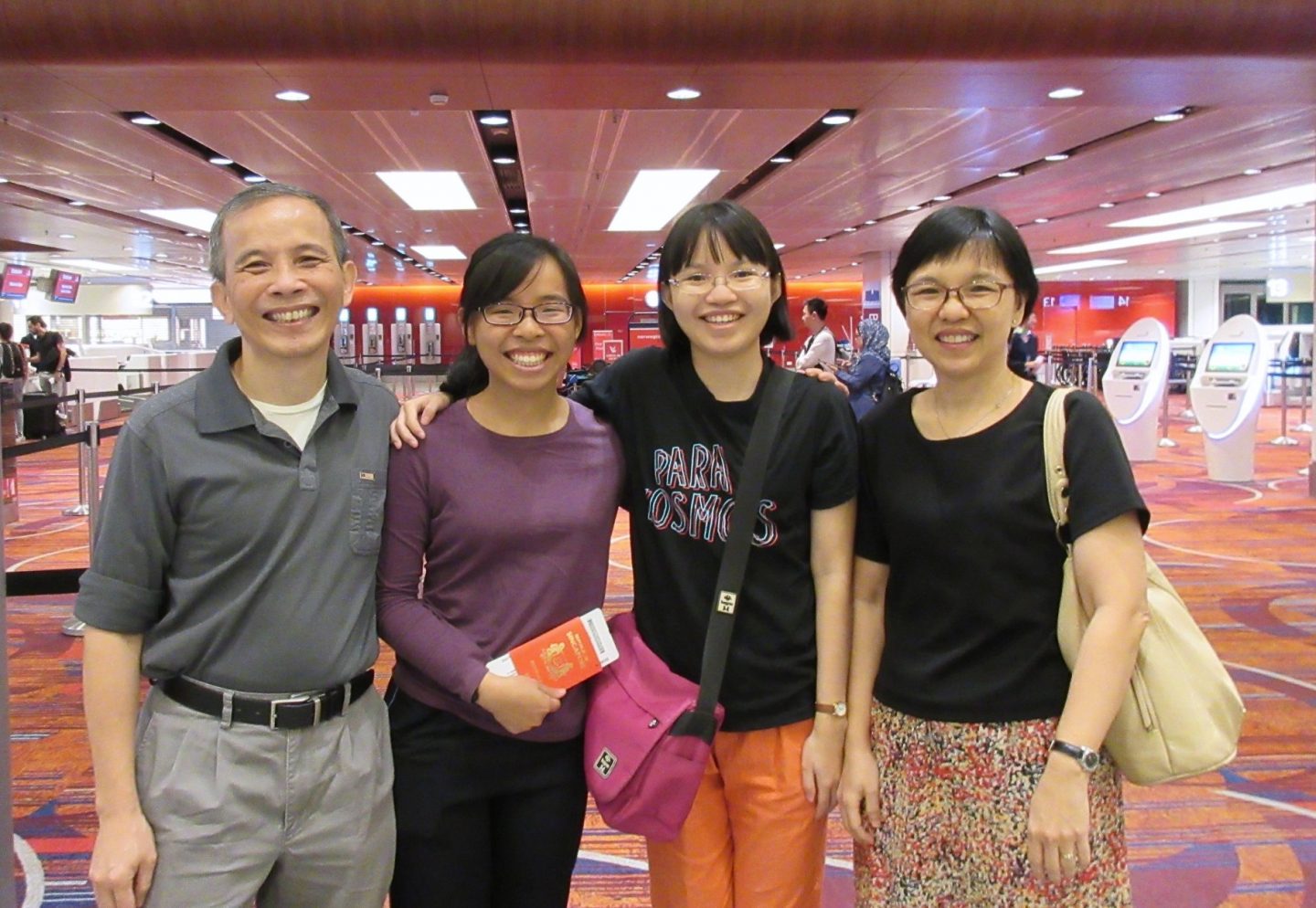
From left: David, daughters Carrie, 19, and Kathryn, 21, and Sharon in a recent family photo.
“I only spoke Hokkien for the first six years of my life. I never went to kindergarten. I learnt English and Mandarin at Primary 1 and I considered them foreign languages.
“In many UPGs, people function in their home language until at least the age of 10.”
David added quietly: “Hokkien had a special place in my heart. My own life was a reflection of what minorities go through.”
The planners and the Planner
Today, 17 years later, the couple continues to work faithfully at Wycliffe Singapore where David is the Executive Director and Sharon the Communications Executive.
Framed on a wall of their home is the oft-quoted verse from Jeremiah: “For I know the plans I have for you,” declares the Lord, “plans to prosper you and not to harm you, plans to give you hope and a future.” (Jeremiah 29:11)
David had planned on using his PhD as a door into cross-cultural missions. Sharon, on the other hand, had never even considered becoming a missionary – let alone plan on raising and home-schooling two daughters in a foreign land.
But both Sharon and David have experienced the good plans of God, and through the service of their lives, countless others from UPGs can now know the God who gives them hope and a future.
About Wycliffe Bible Translators (Singapore)
John Wycliffe was an Oxford professor, scholar and theologian whose writings heavily influenced men like Martin Luther.
He was also the man who completed a translation of the Bible from Latin into English in 1382, a heresy punishable by death under Roman Catholic law. In response to his accusers, Wycliffe said:
“You say it is heresy to speak of the Holy Scriptures in English. You call me a heretic because I have translated the Bible into the common tongue of the people … Did not the Holy Ghost give the Word of God at first in the mother-tongue of the nations to whom it was addressed?”
The founder of Wycliffe Bible Translators, William “Cam” Townsend was convicted that everyone should be able to read God’s Word in the language of their heart.
Today, the vision of Wycliffe Singapore is to see lives and communities transformed through the Word of God in their heart languages.
In various Unreached People Groups around the world, Wycliffe is involved in Bible translation work and conducts literacy and Scripture engagement programs alongside community development work.
Out of 7,099 languages in the world, only 9% (670 languages) have the full translation of the Bible available. As of October 2017, there are still about 1,636 languages, representing 114 million people, where no translation has been started yet.
Find out how you can get involved here.
We are an independent, non-profit organisation that relies on the generosity of our readers, such as yourself, to continue serving the kingdom. Every dollar donated goes directly back into our editorial coverage.
Would you consider partnering with us in our kingdom work by supporting us financially, either as a one-off donation, or a recurring pledge?
Support Salt&Light


